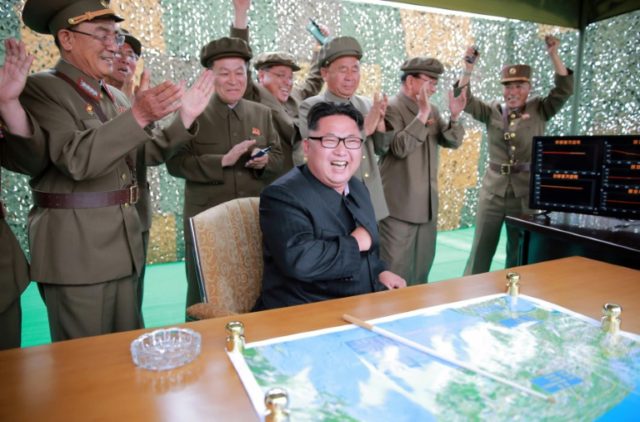South Korea and Japan are looking to China and Russia, permanent members of the United Nations Security Council, to aid in their quest to stop North Korea from conducting yet another nuclear test, following the nation’s fifth and most powerful one yet.
Reports of South Korean and Japanese diplomats reaching out independently to both nations arose on Tuesday. According to South Korean news agency Yonhap, Foreign Minister Yun Byung-se spoke via phone to both the Chinese and Russian foreign ministers, requesting they support a UN resolution to impose harsher sanctions on North Korea.
As permanent members of the Security Council, China and Russia have veto power over any resolution coming out of the council, which makes their support necessary. South Korea has traditionally been able to rely on the support of the other permanent members, the United States, France, and the United Kingdom.
Yun reportedly told both foreign ministers that his nation wishes to see North Korea “pay dearly” for its latest nuclear test.
The UN has banned North Korea from nuclear development, but this has done little to stop dictator Kim Jong-un from continuing to develop the nation’s nuclear program. Last week, international observers warned a seismic event had occurred on the Korean peninsula, which Pyongyang later confirmed was a nuclear test. In response, South Korean officials made uncharacteristically violent statements off the record, with one unnamed official telling Yonhap that Seoul had prepared a plan to turn Pyongyang “into ashes.”
Pyongyang often uses this language against South Korea, going so far as to produce propaganda featuring the dramatization of a nuclear attack on Seoul’s presidential palace.
Japan has reportedly joined South Korea in pressuring China and Russia to support further sanctions on North Korea. Japan’s Kyodo News reported Wednesday that Prime Minister Shinzo Abe had publicly announced his intentions to reach out to the two nations on the North Korea issue. Japanese Foreign Minister Fumio Kishida also spoke to Russian Foreign Minister Sergey Lavrov on Tuesday. As Japan and China have historically suffered adversarial relations, a one-on-one talk with Chinese counterpart Wang Yi is in the works but will take more effort.
Kishida said his conversation with Lavrov — and French Foreign Minister Jean-Marc Ayrault — was productive. “I agreed with the two ministers that North Korea’s nuclear test is utterly intolerable… and that there is a need to send out a strong message that its provocative actions, in any form, cannot be accepted,” he reported.
Chinese officials have sternly condemned the latest nuclear test. “The DPRK’s persisting nuclear weapon development and nuclear tests run counter to the expectations of the international community, escalate tension on the peninsula and is not conducive to the peace and stability there, Vice Foreign Minister Zhang Yesui said on Monday. China is North Korea’s most influential ally and biggest trading partner. The head of North Korea’s parliament, Kim Yong-nam, arrived in China on Tuesday for a brief meeting with North Korea’s ambassador to Beijing.
Russia has been more reluctant to support North Korea than China. Following the latest nuclear test, Lavrov, Yonhap reported, stated that he “shares concerns with the international community” regarding the test and would “take active part in discussions to adopt a new resolution.”
Russia’s foreign ministry has previously warned North Korea that it is opening itself up to invasion if Kim’s regime continues to threaten its neighbors and the United States with nuclear retaliation. “We consider it to be absolutely impermissible to make public statements containing threats to deliver some ‘preventive nuclear strikes’ against opponents,” the ministry said in a statement in March; “Pyongyang should be aware of the fact that in this way the DPRK will become fully opposed to the international community and will create international legal grounds for using military force against itself.”
Russia and China enjoy friendly relations and are currently conducting joint military exercises off the southern coast of China, alarming neighbors in the South China Sea.
While Russia has not been publicly supportive of Pyongyang, Kim has made overtures to President Vladimir Putin, sending him a letter in August arguing that “friendship and cooperation between the DPRK and Russia forged in the hard struggle against the common enemy would invariably develop in line with the aspiration and desire of the peoples of the two countries.”
In the mission to convince Russia and China to support sanctions on North Korea, the nation’s neighbors have largely halted efforts to involve the United States further in curtailing the Kim regime.
President Barack Obama weighed in on the nuclear test over the weekend, noting that North Korea “stands out as the only country to have tested nuclear weapons this century” and urging Kim to stop. The U.S. military has also conducted several B-1 bomber runs in the region, intended to show “an unshakable commitment to defend allies in the region,” according to U.S. Forces Korea commander Gen. Vincent K. Brooks.

COMMENTS
Please let us know if you're having issues with commenting.